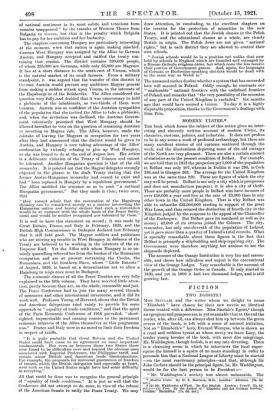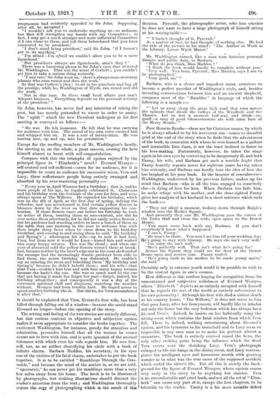FICTION
TWO EGOISTS-t
Miss Srxci..tre and the writer whom we delight to name " Elizabeth " have chosen for their new novels an identical theme treated with a difference. Miss Sinclair's Egoist,' though an egregious and pompous ass, is yet so amiable that at the end the reader, who, after all, can always shut him up between the green covers of the book, is left with a sense of amused irritation. Not so " Elizabeth's " hero, Everard Wemyss, who is shown as a cruel and ruthless tyrant at whose mercy we leave Lucy, the tender young heroine of the book, with most dire misgivings. Mr. Waddington, though foolish, is at any rate diverting. There is a charming scene in which he interviews the local super- squire (he himself is a squire of no mean standing) in order to persuade him that a National League of Liberty thirst be started —on the most reactionary principles—and that, although Sir John Corbett should be the principal figure, he, Mr. Waddington, would be far the best person to be President
" Mr. Waddington's anxiety was almost unbearable. The
• Modern Mater. By H. S. Morrison, M.D. London : Allenson. [7s. ed. not.] t (1) Mr. Waddington of Week. By May Sinclair. London : Cassell. [7s. ed. London ; 2)M Vera. n. By [7sthe Author not .1 of " Elizabeth and her German Garden:* acmilla. 13d.
programme had evidently appealed to Sir John. Supposing, after all, he accepted 7 • I wouldn't ask you to undertake anything sp—so arduous, but that it'll strengthen my hands with my Committee ; in fact, I may get a much stronger and more influential Committee if I can come to them, and tell them beforehand that you have consented to be president.' I don't mind being president,' said Sir John, ' if I haven't got to do anything.' ' I'm afraid—I'm afraid we couldn't allow you to be a mere figurehead.'
' But presidents always are figureheads, aren't they ? '
There was a bantering gleam in Sir John's eyes that irritated Mr. Waddington. That was the worst of Corbett ; you couldn't get him to take a serious thing seriously.
"T any rate,' Sir John went on, ' there's always some secretary johnnie who runs round and does the work.'
So that was Corbett's idea : to sit in his armchair and bag all the prestige, while he, Waddington of Wyck, ran round and did the work.
' Not in this case. In these small local affairs you can't delegate business. Everything depends on the personal activity of the president.' "
Sir John, however, has never had any intention of taking the post, but has merely pretended to waver in order to annoy. The " uplift " which the new President undergoes at his first meeting is conveyed as follows :- " He was. He felt immense. He felt that he was carrying his audience with him. The sound of his own voice excited him and whipped him on. It was a sort of intoxication. He was soaring now, up and up, into his peroration."
Except for the scoffing members of Mr. Waddington's family, the meeting is, on the whole, a great success, causing the hero himself almost to burst with self-congratulation.
Compare with this the triumphs of egoism enjoyed by the principal figure in " Elizabeth's " novel? Everard Wemyss- self-centred and self-sufficient—cares for no audience, for it is impossible to count as audience his successive wives, Vera and Lucy, these unfortunate people being entirely swamped and absorbed by his over=mastering personality :—
" Every year in April Womyss had a birthday ; that is, unlike most people of his age, he regularly celebrated it. Christmas and his birthday were the festivals of the year for him, and were always spent at The Willows. He regarded his birthday, which was on the 4th of April, as the first day of spring, defying the calendar, and was accustomed to find certain yellow flowers in blossom down by the river on that date supporting his con- tention. If these flowers came out before his birthday he took no notice of them, treating them as non-existent, nor did he ever notice them afterwards, for he did not easily notice flowers ; but his gardener had standing orders to have a bunch of them on the table that one morning in the year to welcome him with their bright shiny faces when he camo down to his birthday breakfast, and coming in and seeing them he said, ' My birthday and Spring's' ; whereupon his wife—up to now it had been Vera, but from now it would be Lucy—kissed him and wished him many happy returns. This was the ritual ; and when one year of abnormal cold the yellow flowers weren't there at break- fast, because neither by the river's edge nor in the most sheltered of the swamps had the increasingly frantic gardener been able to find them, the entire birthday was dislocated. He couldn't say on entering the room and beholding them ' My birthday and Spring's,' because he didn't behold them ; and his wife—that year Vera—couldn't kiss him and wish him many happy returns because she hadn't the cue. She was so much used to the cue that not having it made her forget her part—forget, indeed, his birthday altogether ; and consequently it was a day of tho extremest spiritual chill and dinginess, matching the weather without. Wemyss had been terribly hurt. He hoped never to spend another birthday like it. Nor did he, for Vera remembered it after that."
It should be explained that Vera, Everard's first wife, has been killed through falling out of a window—because she could stand Everard no longer—before the opening of the story.
The setting and feeling of the two stories are entirely different, but this curious contrast in objective and subjective egoism makes it seem appropriate to consider the books together. The exuberant Waddington, for instance, greedy for attention and admiration, persuades himself that all the women he comes across are in love with him, and is quite ignorant of the amused tolerance with which even his wife regards him. He sees him- self, too, as an author electrifying his circle with a book of infinite charm. Barbara Madden, his secretary, in his eyes one of the victims of his fatal charm, undertakes to put the book together. It is to be entitled " Ramblings Through the Cots- wolds," and because the mind of the author is, as we are told, " egocentric," he can never get his ramblings more than a very few miles away from his home. The book is to be illustrated by photographs, lest striking illustrations should distract the reader's attention from the text; and Waddington thoroughly enjoys the or of photographing which is the -result of this
decision. Pyecraft, the photographic artist, asks him whether he does not want to have a large photograph of himself sitting at his writing-table :- " I hadn't thought of it, Pyecraft.'
As a matter of fact, he had thought of nothing else. He had the title of the picture in his mind : • The Author at Work in the Library, Lower Wyck Manor.'
Mr. Waddington turned, like a man torn between personal distaste and public duty, to Barbara. ' %That do you think, Miss Madden 7 ' ' I think the book would hardly bo complete without you.' ' Very well. You hear, Pyecraft, Miss Madden says I am to be photographed.' ' Very good, sir.' "
Barbara, who is a clever and impudent minx, eontrives to become a perfect parodist of Waddington's style, and, besides inventing conversations between him and an ancient shepherd, composes most of the " Rambles " in language of which the following is a sample :— " ' Let us away along the great high road that runs across the uplands that divide the valleys of the Windlode and the Thames. Let us rest a moment half-way and drink—no, quaff—a mug of good Gloucestershire ale with mine host of the Merry Mouth. '
Poor Horatio Bysshe—these are his Christian names, by which he is always alluded to by his irreverent son—comes to dreadful grief at the end of the story when he finds that the adventuress of the book, in connexion with whom he sees himself as a gallant and irresistible Don Juan, is not the least inclined to listen to his love-making. Fortunately, however, he takes the stage again in his own eyes by contriving to be dangerously ill, and both Fanny, his wife, and Barbara get such a terrible fright that Fanny heartily repents never for eighteen years having taken him seriously, and Barbara can hardly bear the idea of how she has laughed at his poor book. In the languor of convalescence Waddington, undeterred by his previous failure, makes up his mind that Barbara—who is all the time engaged to somebody else—is dying of love for him. When Barbara too fails him, he seeks refuge with his mother, and the clear-sighted Fanny gives her analysis of her husband in a short sentence which ends the book :- "They sat silent a moment, looking down through Ralph's window into the Market Square.
And presently they saw Mr. Waddington pass the corner of the Town Hall and cross the wide, open space to the Dower House.
' You must come back with me, Barbara. If you don't everybody'll know what's happened.'
' I can't, Fanny.'
' He won't be there. You won't see him till your wedding day. He's going to stay with Granny. He says she isn't very well.' i ' I'm sorry she isn't well.' ' She's perfectly well. That isn't what he's going for.' Across the Square they could see the door of the Dower House open and receive him. Fanny smiled.
• He's going back to his mother to be made young again,' she said."
Certainly only in extreme youth would it be possible to wish to be the central figure in one's cosmos.
How different is this restless longing for recognition from the concentrated and subjective selfishness of Everard Werayss, whom " Elizabeth " depict& as so entirely occupied with himself that he regards the rest of the world as entirely subservient to his own personality! Although his first wife died a violent death at his country house, " The Willows," it does not occur to him that poor Lucy, after her honeymoon, will hardly like to inhabit not only the house but the very bedroom which has always been his and Vera's. Indeed, he insists on her habitually using the sitting-room which contains the fatal window from which Vera fell. There is, indeed, nothing entertaining about Everard's egoism, and his tyrannies to his household and to Lucy seem so impossible in any sane man as to make his portrait almost a caricature. The book is entirely centred round the hero, the only other striking point being the influence which the dead Vera exerts over the shrinking Lucy. Vera's photograph enlarged to life-size hangs in the dining-room, and Lucy contem- plates the intelligent eyes and humorous mouth with growing wonder as to what was the true cause of the supposed accident which ended the sitter's life. But all this is merely the back-
ground for the figure of Everard Wemyss, whose egoism ceases
very early in the story to be anything but sinister. Vera is an uncomfortable and cmeLbook, and not all the art of " Eliza- beth" can cause any part of it, except the first chapters, to be tolerable to the reader. Vanity is a far more amiable defect than self-sufficiency, and " Horatio Bysshe " becomes a positively attractive figure when contrasted with the terrible Everard.




































 Previous page
Previous page